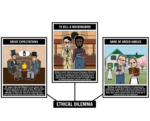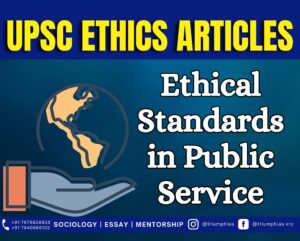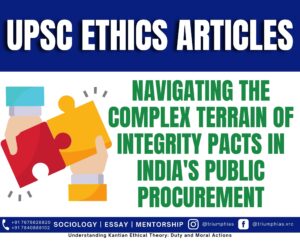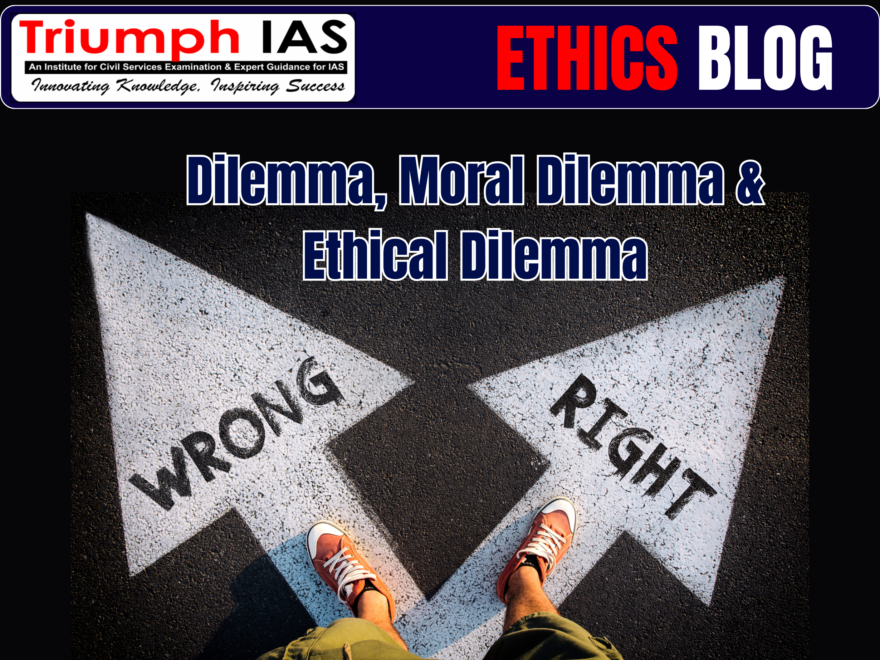Dilemma, Moral Dilemma & Ethical Dilemma
[Relevant for Public Ethics, Integrity and Aptitude]
Dilemma
A dilemma is to be in a state of confusion, about options available to me, not necessarily involving any moral question. So, I am in dilemma whether to go by car or by metro. You can be in dilemma whether you read this blog or not. Dilemma, thus, is morally neutral i.e. it has no moral connotation.
Moral Dilemma
It is one step ahead of simple Dilemma. In this there are two or more than two options and each has some moral connotation but to take action on any one of the options is not necessity here.So, I am in moral dilemma whether to give or to not give alms to beggar.

Ethical Dilemma
It has the dimension of both dilemma and moral dilemma with this other criterion that now the moral agent has to take one option. So, an ethical dilemma arises from a situation that necessitates a choice between competing sets of principles.
Thus, an ethical dilemma can be described as a circumstance that requires a choice between competing sets of principles in a given, usually undesirable or perplexing, situation.

There are three conditions that must be present for a situation to be considered as ethical dilemma-
- The first condition occurs in situations when an individual, called the “agent,” must make a decision about which course of action is best. Situations that are uncomfortable but that don’t require a choice are not ethical dilemmas as this comes under moral dilemma.
- The second condition for ethical dilemma is that there must be different courses of action to choose from.
- Third, in an ethical dilemma, no matter what course of action is taken, some ethical principle is compromised. In other words, there is no perfect solution.So, if in the above example, if I went as an NGO representative working in the field of urban poor, and saw beggar who wants money either I give him few bucks or I co-ordinate him to a shelter home where he can be evaluated for further action so that he gets out of this begging habit.
Types of Ethical Dilemmas – From a PS (Public Servant) perspective
Conflicts of interest are possibly the most obvious example that could place public sector leaders in an ethical dilemma.

These dilemmas are in three broad categories:
Personal Cost Ethical Dilemmas– This dilemma arises from situations in which compliance with ethical conduct results in a significant personal cost (e.g. jeopardizing held position, missing opportunity for financial or material benefit, injuring valued relationship etc.) to the public-servant-decision-maker and/or the Agency
Right-versus-Right Ethical Dilemmas– This dilemma arises from situations of two or more conflicting sets of bona fide ethical values (e.g. public servants’ responsibility of being open and accountable to citizens versus that of adhering to the Oath of Secrecy/Confidentiality etc.)
Conjoint Ethical Dilemmas– This dilemma arises from situations in which a conscientious public-servant-decision-maker is exposed to a combination of the above-indicated ethical dilemmas in searching for the “right-thing-to-do”. So, if a subordinate finds that his superior engages in domestic violence but otherwise is efficient and professional – this involves Conjoint Ethical Dilemmas.
(Reference: Static portion)
Frequently Asked Questions:
Dilemmas, particularly moral and ethical ones, often provoke thought and discussion. Here are some frequently asked questions related to these topics that are currently trending on Google.
What is a moral dilemma?
A moral dilemma is a situation where a person must choose between two or more conflicting moral principles or actions, each of which has significant ethical implications. In these scenarios, no option is clearly the right choice, and every possible action may lead to negative consequences for someone involved.
What is an ethical dilemma?
An ethical dilemma involves a decision-making process where a person faces two or more conflicting ethical principles. Unlike moral dilemmas, which often involve personal values, ethical dilemmas typically relate to broader societal norms and professional standards.
How do you solve a moral dilemma?
Solving a moral dilemma often requires careful consideration of the consequences of each option, reflecting on personal values, and sometimes seeking advice from others. It may involve weighing the potential outcomes for all parties involved and making a decision that aligns with one’s core beliefs, even if it is difficult.
What are some examples of moral dilemmas?
Common examples include:
– Deciding whether to report a friend who has committed a crime.
– Choosing whom to save in a life-threatening situation when only one can be saved.
– Facing a choice between loyalty to a friend and honesty.
What are some examples of ethical dilemmas?
Examples of ethical dilemmas include:
– A doctor deciding whether to prioritize a patient who is critically ill or one who has a better chance of recovery.
– An employee witnessing unethical behavior at work and deciding whether to report it, risking their job.
– A journalist choosing between protecting a source and publishing information that serves the public interest.
Why are moral dilemmas important?
Moral dilemmas are important because they challenge individuals to reflect on their values and ethics. They help people understand their principles and how they might act in difficult situations, ultimately shaping their moral character and decision-making processes.
How can ethical dilemmas affect professional life?
Ethical dilemmas can significantly impact professional life as they may lead to conflicts between personal values and organizational expectations. Employees may face situations where they must choose between adhering to company policies and acting in accordance with their moral beliefs, which can lead to stress, job dissatisfaction, or even career changes.
Related Blogs …
 |
 |
Follow us :



Find More Blogs…
| Compare and contrast Karl Marx’s and Max weber’s | Karl Marx- Historical Materialism |
| Position of Women In the Modern Indian Society | Sociology: Social system and pattern variables |


